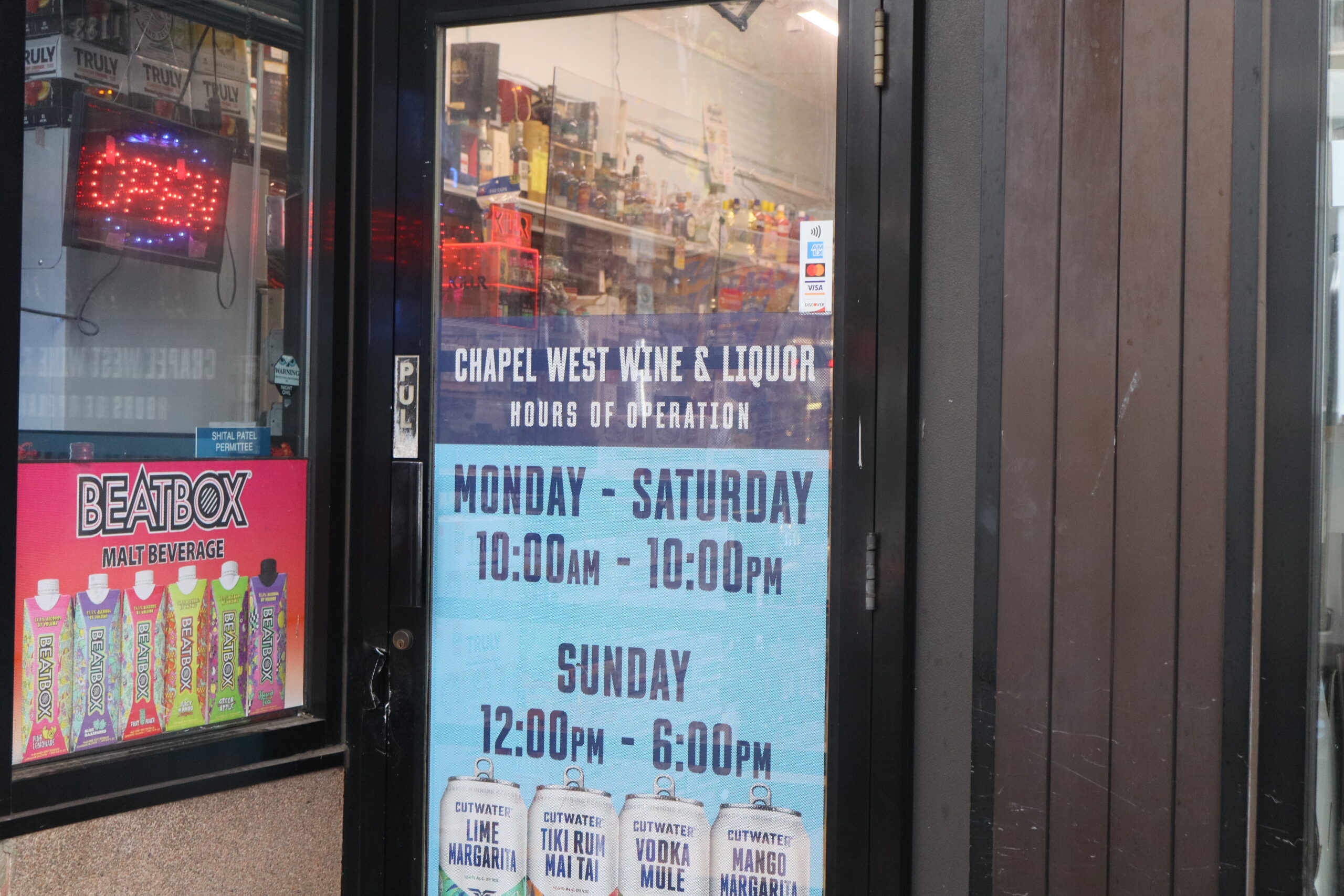Why do liquor stores in New Haven close so early?
Connecticut’s strict rules about alcohol sales are rooted in the state’s Puritan past.

Martin Peralta, Contributing Photographer
In the minutes before 10 p.m. on Friday or Saturday night, Yale students can often be spotted rushing to the door of Temple Wine & Liquor in downtown New Haven.
By law, Connecticut liquor stores must close their doors at 10 p.m. sharp, and store manager Anthony Simmons does not want to risk a fine by selling a bottle of liquor a minute past that.
“People try to rush in when they only have like a few seconds left,” Simmons said. “But anything after 10 o’clock would be against the state.”
The restrictions on liquor store hours have long been a part of Connecticut law and, historians say, are rooted in the state’s Puritan past. These religious restrictions are known as “blue laws.”
From 1854 to 1872, Connecticut completely banned the sale of alcohol, but enforcement was largely nonexistent. From 1919 to 1933, alcohol was prohibited again under the 18th Amendment to the U.S. Constitution. In 1933, the Liquor Control Commission was created by the state to regulate the sale of alcohol after the repeal of prohibition under the 21st Amendment, and the Liquor Control Act was passed.
Weekday hours were gradually extended throughout the twentieth century. On May 20, 2012, liquor stores were granted permission to sell alcohol during limited hours on Sundays. The current weekday and weekend hours were set on July 1, 2015.
Among other states, Maine and Massachusetts have loosened their restrictions on alcohol sales over the years, but Connecticut remains one of the strictest in New England when it comes to alcohol. Liquor stores in Connecticut are forbidden from making sales past 10 p.m., and they must close by 6 p.m. on Sundays.
Laws vary across the region, according to 360 Training, an online educational service that offers food and alcohol worker certification courses. In Maine, liquor stores can remain open from 5 a.m until 1 a.m. all week. In Massachusetts, liquor stores can remain open until 11 p.m. all week, including on Sundays. In New York, they can remain open until midnight on Monday through Saturday, and until 9 p.m. on Sundays. Neighboring Rhode Island has the same regulations as Connecticut.
Connecticut’s restrictions on alcohol sales may soon feel more outdated. On Oct. 1, Connecticut will officially lift another centuries-old blue law banning hunting on Sundays.
This marks another step in the gradual repeal of Connecticut’s blue laws. The state’s earliest blue laws strictly regulated behavior on the Sabbath, banning work, travel, and drinking on Sundays to fit with Puritan values. Most have since been repealed, but liquor restrictions still remain.
For Simmons, who manages Temple Wine & Liquor, the effects of the laws are not straightforward. Simmons said that extended hours could help his business on weekends, but could cost him money during the week when demand is lower.
“Maybe Fridays and Saturdays, weekends, we could potentially make more money,” Simmons said. “Sometimes we might be losing money by staying open later.”
Simmons believes that these laws protect small businesses. Unlike some other states, Connecticut doesn’t permit the sale of wine or liquor in grocery stores, which ensures that liquor stores maintain business. Blue laws may be frustrating for customers late at night, but they keep corporate competition away.
“We still have the market,” Simmons said. “So I think the law on that one does help us out a lot.”
The persistence of these restrictions has its roots in New Haven’s history. When English Puritans Theophilus Eaton and Reverend John Davenport — the namesake of Davenport College — founded the colony in 1638, they set some of the strictest moral codes in New England.
“The Puritans in New Haven were so incredibly religiously strict,” Emma Norden, a librarian at the New Haven Museum, told the News. “They were a lot more strict than people in Connecticut Colony and people in Massachusetts Bay.”
Among the museum’s archives are copies of “The Temperance Journal” and other records of historical laws from the 1800s and earlier, which explain how seriously Connecticut’s early leaders took religion and morality.
“There’s still so much religion in New Haven,” Norden said. “There’s still so many churches that are active in a huge way.”
Connecticut’s conservative approach to liquor is not unique, Michael Morand, New Haven’s official city historian, said. Many states across the United States still restrict alcohol sales.
“Liquor tends to be more of a thing that people tend to put restrictions on than other things,” Morand said.
However, in a state that has legalized cannabis and is known for its progressive nature, these residual liquor laws stand out, Morand acknowledged.
“Liquor has been the place that the sort-of Puritan sensibility stayed the longest,” he said.
Why do these rules persist? Morand thinks a mix of tradition and pragmatism have kept them around so long.
Courts have historically upheld a Sunday “day of rest” as a public good, even as it has disconnected it from its religious history. Additionally, liquor store owners themselves haven’t always pushed for a change.
“Nobody wants the whole place to be ‘on’ twenty-four-seven,” Morand said.
As Connecticut repeals its long-held Sunday hunting ban, the liquor restrictions remain a reminder of how the state’s Puritan past shapes its present. For some store managers, like Simmins, blue laws simultaneously protect and limit business. For many customers, however, they may be a frustrating and outdated formality.
These restrictions — some of the last remnants of the state’s historic blue laws — are a “weird one-off,” Morand said.
One of Connecticut’s nicknames is “The Land of Steady Habits.”
Interested in getting more news about New Haven? Join our newsletter!







